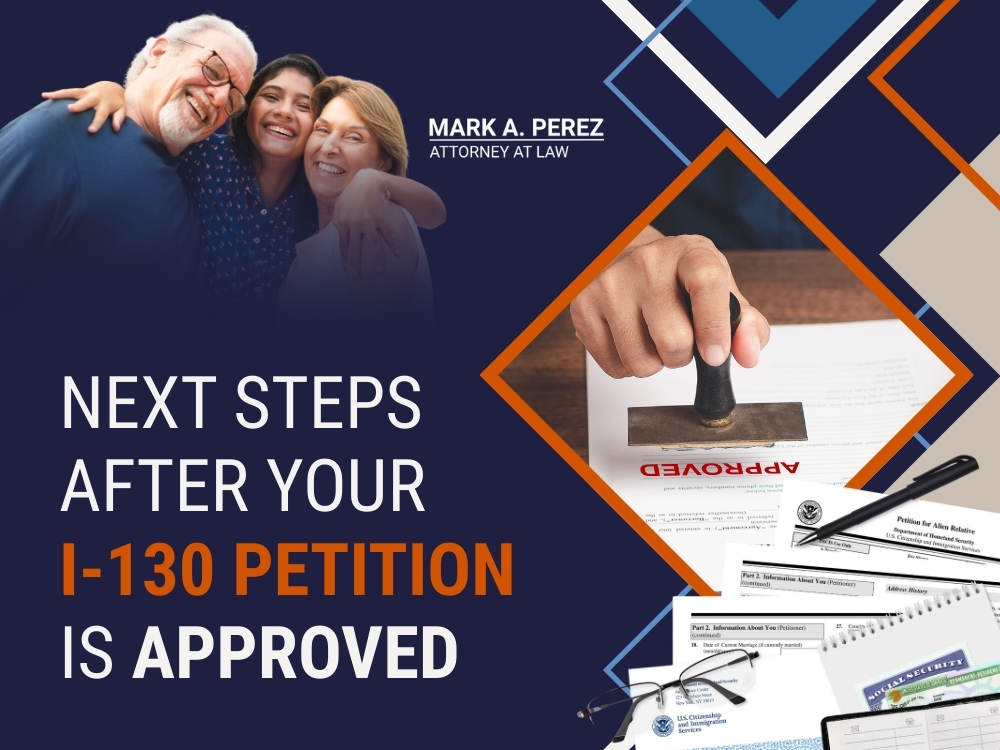Form I-130 Petition
MARK A. PEREZ, ATTORNEY AT LAW
For many people who want to become residents in the United States, the I-130 petition is the first step toward obtaining a green card or naturalization. The I-130 petition is used to open the door toward immigration for a family member such as a husband, wife, parent, sibling or child. It can also be used for people who will become family, such as a fianc(é)e.
The I-130 petition is called the Petition for Alien Relative, also known as a family petition. The U.S. citizen or permanent resident filing the petition agrees to sponsor the named relative. The I-130 petition process is complicated, and if not handled properly, your application can be delayed or denied altogether. The easiest and most efficient way of getting your I-130 application approved is to get the help of an experienced family immigration attorney.
My name is Mark A. Perez, and I am an experienced family immigration attorney serving Dallas and all of Texas. I am committed to serving my clients by doing my best to help them achieve their objectives quickly and affordably. I will make sure your petition is filed properly with all of the supporting documentation the first time. Call me for a free consultation at (214) 752-0505.
For now, here’s what you need to know to get started with a I-130 petition.
Table of Contents
PROTECTING YOUR FUTURE AND YOUR LIBERTY
If you're facing criminal charges, don't gamble with your future. Call me today.
Who Is Eligible to File an I-130 Petition?
Not everyone can use the I-130 petition. Only U.S. citizens and lawful permanent residents (green card holders) are eligible to sponsor certain family members.
- S. Citizens can file an I-130 for their spouse, children (married or unmarried, any age), parents, and siblings.
- Lawful Permanent Residents (Green Card Holders) can file for their spouse and unmarried children under 21.
It is important to understand that different categories of relatives have different wait times based on the number of visas that can be granted a year.
For example, immediate relatives of U.S. citizens (spouse, parents, and unmarried children under 21) don’t have limits on the number of visas issued a year and, therefore, have shorter wait times. Other relatives, such as siblings of U.S. citizens or relatives of green card holders, may face longer wait times due to visa limits.

An experienced family immigration attorney can explain which relatives qualify and guide you through the process to avoid mistakes or delays.
How Long Is Form I-130 Processing?
Approval for an I-130 depends on several factors, including the number of USCIS applications, the immigrant’s country of origin and whether all adequate documentation has been provided. Realistically, the backlog for countries with many familial applicants, such as Mexico, will be much longer than for other countries. Processing times depend on:
- USCIS caseload and processing center workloads.
- The beneficiary’s country of origin.
- Completeness and correctness of the paperwork submitted.
- The petitioner’s and beneficiary’s qualifying relationship.
For countries with high numbers of family-based immigration applicants, like Mexico, the Philippines, and India, expect longer wait times due to visa backlogs.
Don't Wait. Call Us Today!
What Happens After Form I-130 is Approved?
Approval of Form I-130 is an important milestone, but it does not, by itself, grant permanent residence. Instead, it confirms that USCIS recognizes a qualifying family relationship and allows you to move forward with the next step in the green card process.
Once your I-130 is approved, the case is sent to the National Visa Center (NVC). The NVC manages visa availability, which depends on annual numerical limits. Your place in line is determined by your priority date — generally the date USCIS received your I-130 petition. When a visa number becomes available, you may take the next step based on your location:
- If you are inside the U.S. and eligible: You may apply for Adjustment of Status with USCIS by filing Form I-485 to become a lawful permanent resident without leaving the country.
- If you are outside the U.S.: You will go through Consular Processing at a U.S. embassy or consulate in your home country to obtain an immigrant visa and enter the U.S. as a permanent resident.

In short, an I-130 approval does not provide lawful permanent residence on its own — it is the foundation that allows you to proceed with either adjustment of status or consular processing, depending on your situation.
Frequently Asked Questions to a Family-Based Immigration Lawyer
How can I avoid being denied or delayed?
The greatest cause for I-130 petitions being denied is incomplete paperwork. USCIS needs to verify all of the information contained within the petition, and all of the necessary documentation must be provided at the time of application. When you work with our firm, your family immigration attorney will make sure your paperwork is complete before filing the paperwork to ensure your application is not delayed.
Many I-130 petitions are delayed or denied because of:
- Incomplete or inconsistent documentation, such as incorrect names, missing birth certificates, or missing proof of relationship.
- Errors in filing fees or required forms, and any inaccurate or contradictory information.
- Failure to provide certified translations or required supporting evidence.
Does an I-130 approval mean my family member can move to the U.S. right away?
No. Approval of the I-130 only confirms the family relationship. Your relative must still wait for a visa number to become available before applying for a green card.
Can an I-130 petition be expedited?
In rare situations, USCIS may allow expedited processing, but you must show urgent humanitarian reasons or other qualifying circumstances.
What if my I-130 petition is denied?
If denied, you will receive a notice explaining the reason. You may be able to file an appeal or submit a new petition with the missing or corrected information.
Schedule a Consultation with Family Immigration Attorney Mark A. Perez
With years of experience in immigration law, our firm delivers:
- Personalized attention to your case because we understand the stakes.
- Strategic planning for family visa backlogs and priority dates.
- Transparent, upfront fee estimates allowing you to know what it will cost you.
- Aggressive defense in case of complications or denials.
If you are looking to sponsor a family member who wants to immigrate to the United States or you are looking to gain permanent residency, get experienced help from Mark A. Perez, Attorney at Law. You can reach my Dallas law firm using my online form or by calling 214-758-8630.

